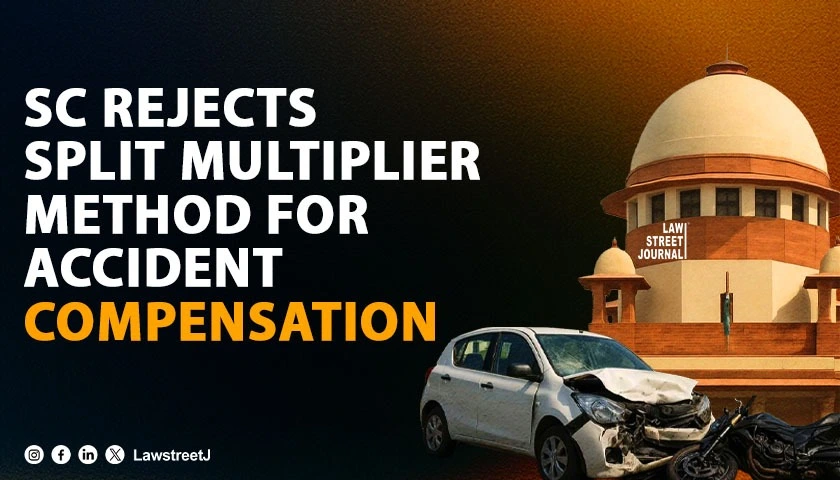New Delhi: The Supreme Court has ruled that the ‘split multiplier’ method of computing compensation in motor accident claim cases is impermissible under the Motor Vehicles Act, 1988, holding that compensation must be calculated solely on the basis of the deceased’s income at the time of death.
A Bench comprising Justice Sanjay Karol and Justice Prashant Kumar Mishra delivered the judgment on November 6, 2025, while allowing a batch of appeals titled Preetha Krishnan & Ors. v. United India Insurance Co. Ltd. & Ors., arising from a Kerala High Court decision that had reduced compensation by applying a split multiplier.
The case involved the death of a 51-year-old Assistant Engineer who was killed in a road accident in August 2012. The Motor Accident Claims Tribunal (MACT) at Pala had awarded ₹44,04,912 as compensation, which the Kerala High Court later reduced to ₹35,10,144 by applying a split multiplier, reasoning that the deceased was close to superannuation and his post-retirement income would have been lower.
Setting aside the High Court’s decision, the Supreme Court held that such a computation method is contrary to the settled principles laid down in Sarla Verma v. DTC and National Insurance Co. Ltd. v. Pranay Sethi. The Court observed that “superannuation from service hardly qualifies as an exceptional circumstance to justify the use of a split multiplier.”
Rejecting the High Court’s reasoning, the Bench held that compensation must be determined on a uniform basis linked to the age of the deceased, not the period of remaining service or projected future income changes. The Court clarified:
“We hold that the income as on the date of death is to be taken to calculate the compensation. In other words, split multiplier is a concept foreign to the Motor Vehicles Act, 1988, and is not to be used by the Tribunal and/or Courts in the calculation of compensation.”
The judgment highlighted inconsistencies among various High Courts in applying the split multiplier concept, leading to divergent compensation outcomes in identical circumstances. The Court noted that such intra-court and inter-court inconsistencies undermine judicial uniformity and create uncertainty in the computation of “just compensation.”
Referring to Sumathi v. National Insurance Co. Ltd., the Bench reiterated that “split multiplier cannot be applied unless specific reasons are recorded” and that retirement from service cannot be considered a special or exceptional reason.
The Court recalculated the compensation at ₹47,76,794 with interest as awarded by the Tribunal, restoring and enhancing the amount payable to the claimants. It directed the insurer to remit the compensation directly to the appellants’ bank accounts before November 30, 2025.
In conclusion, the Court directed that its decision be circulated to all High Courts and Motor Accident Claims Tribunals for uniform application of the principle that the income as on the date of death must form the sole basis of computation under Section 166 of the Act.
Appearances: Mr. Bijo Mathew Joy, AOR, and Ms. Gifty Marium Joseph, Advocate, appeared for the petitioner; whereas Mr. Pradeep Gaur, Adv., Mr. Amit Gaur, Adv., Ms. Sweta Sinha, Adv., and Mr. Rameshwar Prasad Goyal, AOR, appeared for the respondents.
Case Title: Preetha Krishnan & Ors. v. United India Insurance Co. Ltd. & Ors.











